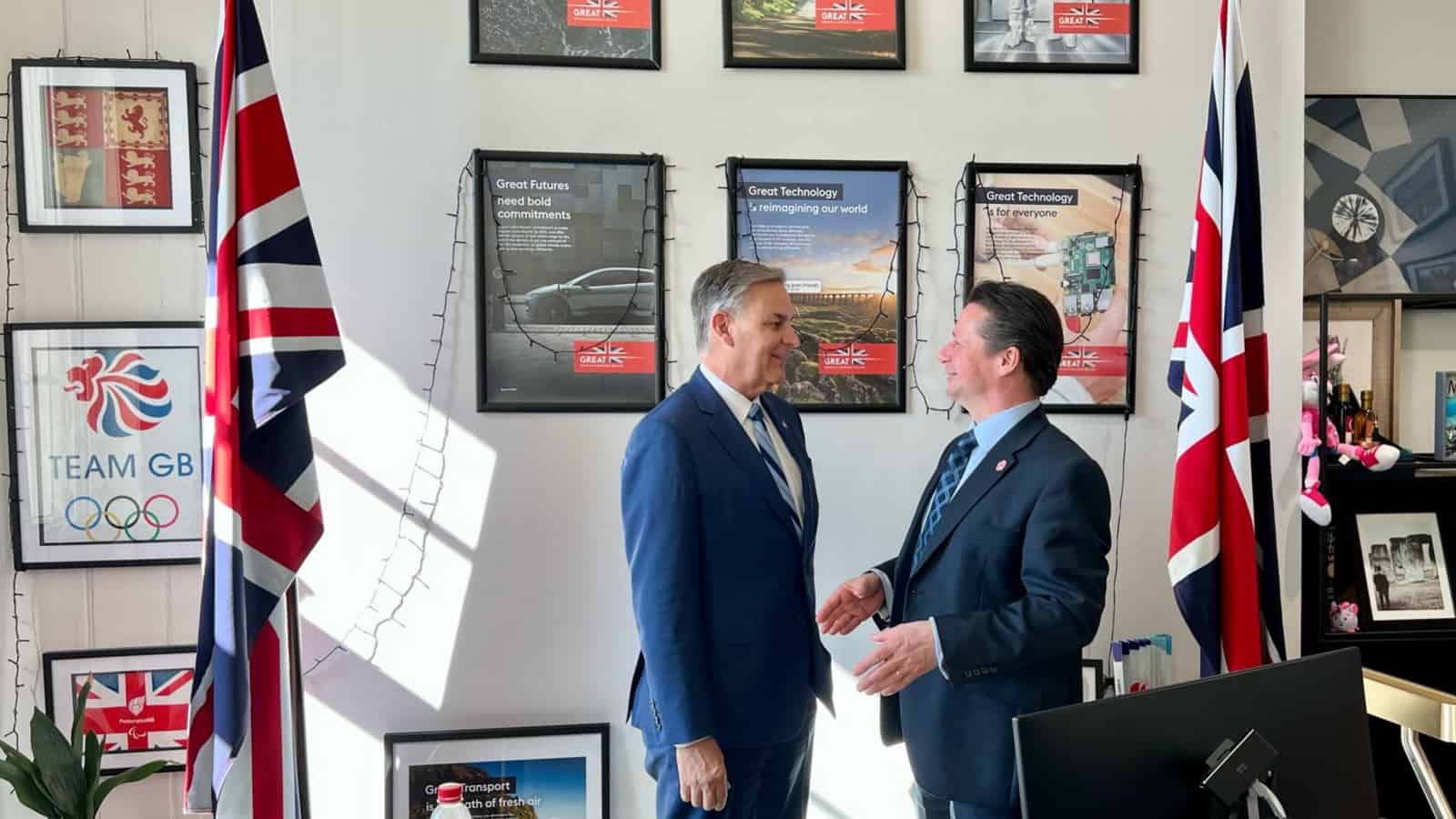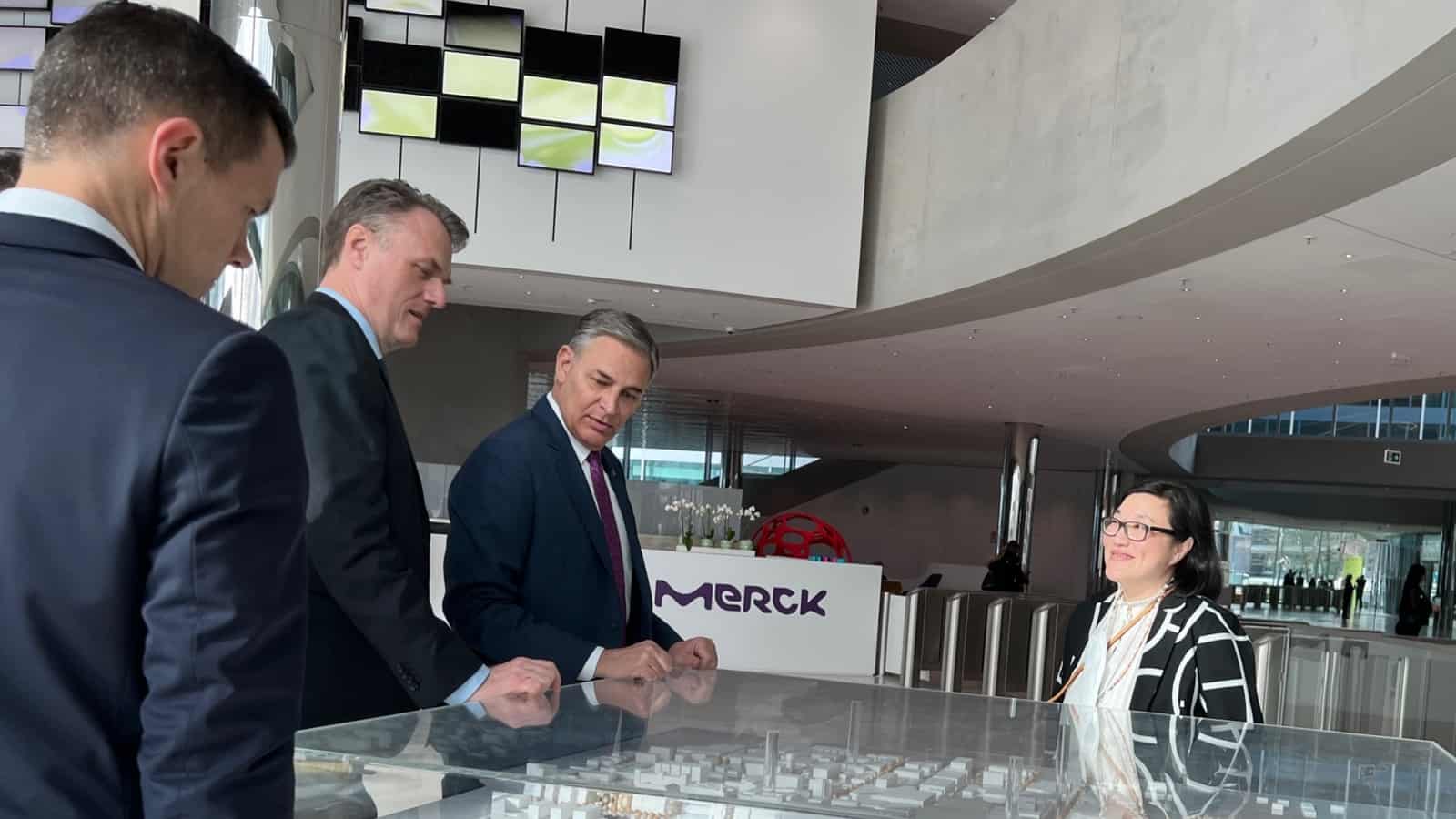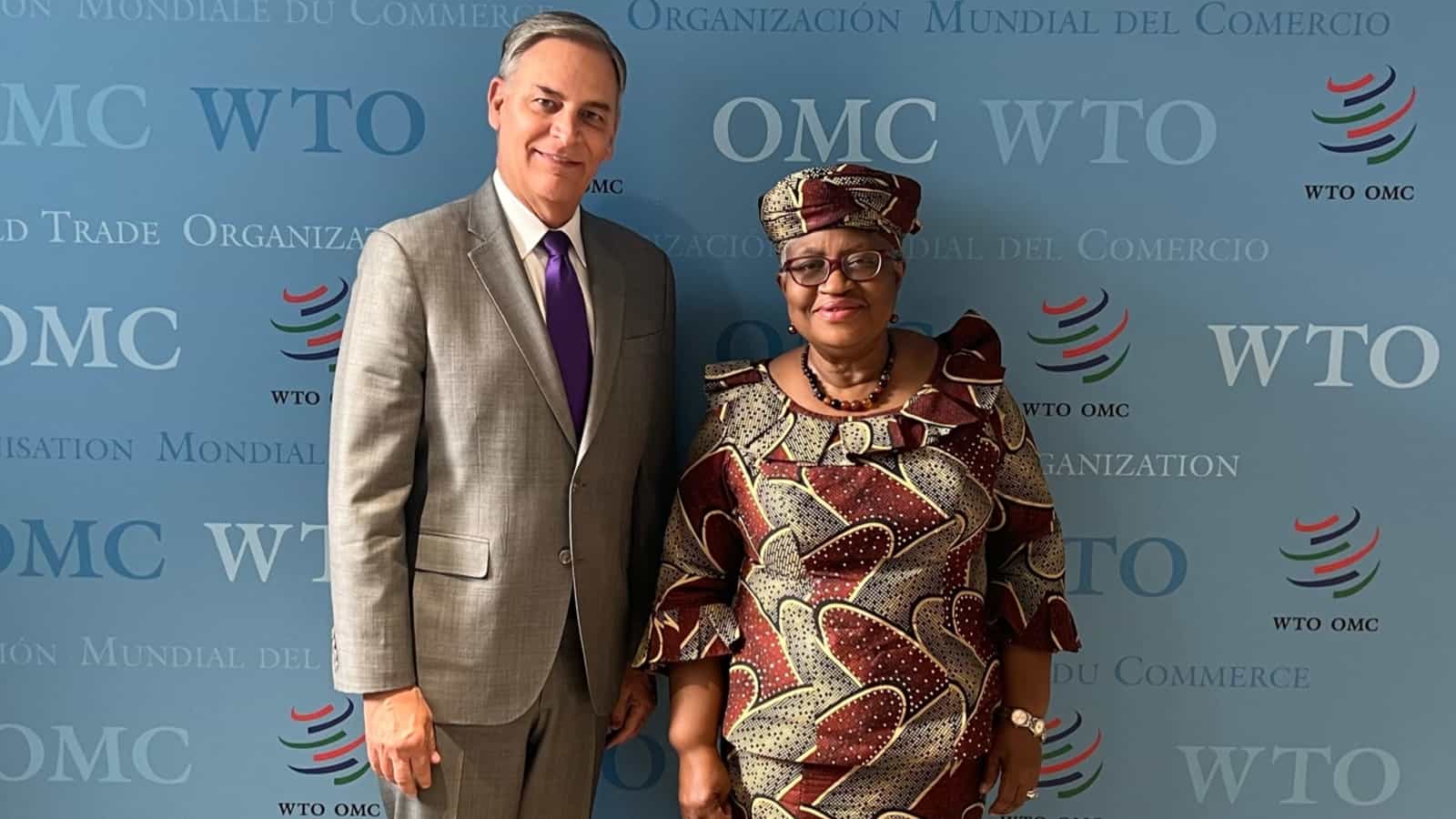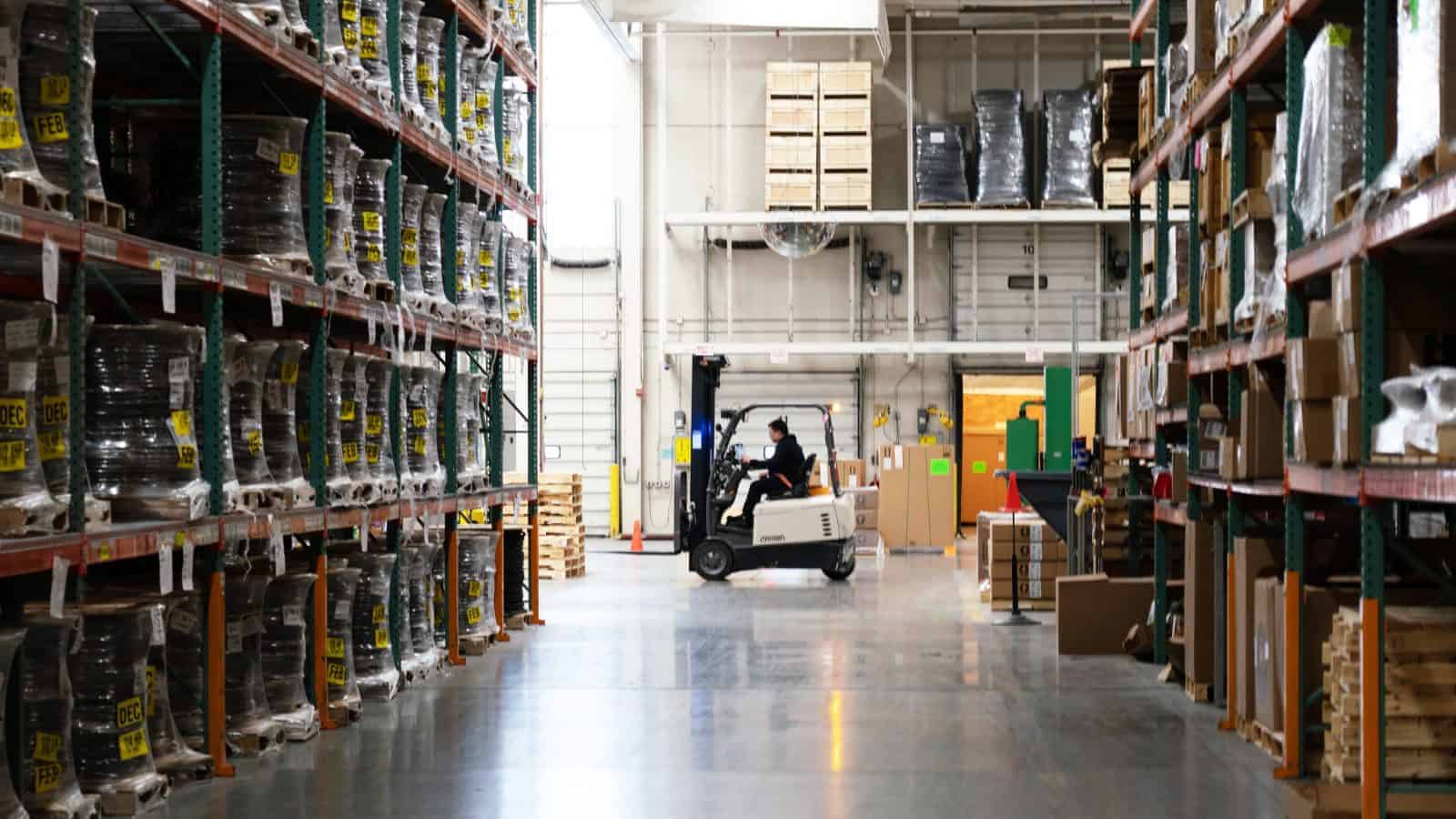Panama Canal Drought Hits Shippers

The Panama Canal—which “handles about one-third of Asia-to-Americas seaborne trade”—is at its lowest level in more than 100 years, a development that could jeopardize global supply chains, according to The Wall Street Journal (subscription).
What’s going on: “The government agency that manages the artificial waterway implemented travel restrictions in May to avoid ships running aground, and since then, some large vessels have had to reduce container loads by roughly one-quarter. Further restrictions could go into effect in late June, authorities say.”
- In the first five months of 2023, rainfall in the canal area was 47% below the historical average.
- The canal, which opened in 1914, depends heavily on rainfall to replenish the tens of millions of gallons of water that flow into the sea each time a ship goes through the canal’s locks.
Why it’s important: “Disruptions in the canal’s operations would hurt Southern Hemisphere exporters and importers in the north. Brazilian meat, Chilean wines and bananas from Ecuador are routinely shipped across the canal, along with copper from Chile and liquefied natural gas from the U.S. Gulf Coast.”
- Panamanian officials are trying to avoid a repeat of the problems that afflicted the Suez Canal in March 2021, when a large containership blocked that waterway for nearly a week, costing billions of trade dollars.
The fallout: “In addition to cutting cargo loads, shipowners are adjusting to Panama Canal restrictions by moving containers to trains to ensure safe passage through locks. In some instances, boxes are unloaded from ships on the Pacific Ocean side of the canal, moved by rail and returned to ships before they continue their voyage through the Atlantic Ocean.”
- The Panama Canal Railway has seen a 20% increase in cargo volume as a result of the drought.
- Shipowners are responding by charging an average of $600 more per box on vessels that cross the canal.
- The daily Asia–U.S. East Coast freight rate was $2,400 per container in May, according to Freightos Baltic Index, but it is expected to rise this month partly due to the drought surcharge.
What’s next: Large container shipping companies “have no plans to divert ships away from Panama”—for now. “[E]xecutives said it could happen if drought conditions persist.”
Senior U.S., China Officials Talk Trade, Exports

Commerce Secretary Gina Raimondo met with Chinese Commerce Minister Wang Wentao Thursday evening to talk “trade, investment and export policies” in the first Cabinet-level discussion between the two nations in months, Reuters reports.
What happened: The officials “had candid and substantive discussions on issues relating to the U.S.–China commercial relationship, including the overall environment in both countries for trade and investment and areas for potential cooperation,” the Commerce Department announced in a readout of the sit-down.
- “Secretary Raimondo also raised concerns about the recent spate of [People’s Republic of China] actions taken against U.S. companies operating in the PRC,” including an uptick in investigations against these companies’ China operations.
- Wang—who is also confirmed to meet today with U.S. Trade Representative Katherine Tai—voiced concerns over some of the Biden administration’s China policies, “including on semiconductors, export controls and reviews of foreign investments, a Chinese Commerce Ministry statement said,” according to Reuters.
- Both meetings are taking place on the sidelines of U.S.-hosted meetings at the Asia-Pacific Economic Cooperation organization happening this week in Detroit.
What they agreed: Raimondo and Wang said they would begin and maintain open communication, which China’s Commerce Ministry said would let the two countries discuss specific trade and cooperation matters.
Additional background: Earlier this week, Wang met with U.S. firms, with whom he stressed “the importance of the China market for American companies,” reports the South China Morning Post (subscription).
Why it’s important: Thursday’s Raimondo–Wang exchange comes after President Biden and other G7 leaders “said they would ‘de-risk’ without ‘decoupling’ from the world’s second-largest economy in everything from chips to minerals,” according to Reuters.
NAM and Make UK Sign MOU to Strengthen Economic Stability and Security Across the Atlantic
Associations Call for Expanded Bilateral Trade and Economic Relationship
Washington, D.C. – Today, the National Association of Manufacturers and Make UK hosted a meeting at NAM headquarters where they formalized manufacturers’ commitment to supporting close economic ties between the United States and United Kingdom. Make UK CEO Stephen Phipson and NAM President and CEO Jay Timmons signed an updated memorandum of understanding, which will serve as a roadmap to the cooperation between the two organizations and outlines the key goals and objectives for the partnership.
“The NAM and Make UK have such a strong, special relationship, just as the U.S. and the UK do, and we must continue to deepen that partnership and the commercial and economic ties between our countries,” said Timmons. “Cooperation between American and British companies not only makes our economies stronger, but also strengthens the transatlantic strategic alliances to support the rule of law, freedom and opportunity from those who threaten our shared values. Especially with Russia’s continued assault on Ukraine, it is critical that we unleash the power of commerce to preserve, protect and expand democracy.”
The MOU calls for Make UK and the NAM to work together to provide opportunities for their members to strengthen manufacturing through a number of avenues, including exploring potential trade delegations, trade fairs and business networks; facilitating visits and economic delegations between representatives of the two organizations for promoting trade, investment and commercial exchanges among member companies and organizations; and working together on joint meetings, conferences, seminars, reports, letters and mutually agreed advocacy on trade and investment-related issues.
“Make UK is delighted to have further strengthened our partnership agreement with our American counterpart, the National Association of Manufacturers, as we focus increasingly on boosting cross-Atlantic trade,” said Phipson. “In recent months, we have agreed to a process of even broader sharing of market intelligence, data and policy work, facilitating visits for economic delegations to visit on both sides of the Atlantic to unlock new trading opportunities.
“We will continue to work ever more closely as we look to cement commercial exchanges and opportunities for shared promotion as we build on the ties that have connected our two nations for generations. Relations with the U.S. are vital, and its market is the second-most important for UK goods. In a post-Brexit world, it is likely to assume ever greater importance as part of our efforts to boost global trade.”
Click here to view the full text of the MOU.
-NAM-
The National Association of Manufacturers is the largest manufacturing association in the United States, representing small and large manufacturers in every industrial sector and in all 50 states. Manufacturing employs nearly 13 million men and women, contributes $2.90 trillion to the U.S. economy annually and accounts for 55% of private-sector research and development. The NAM is the powerful voice of the manufacturing community and the leading advocate for a policy agenda that helps manufacturers compete in the global economy and create jobs across the United States. For more information about the NAM or to follow us on Twitter and Facebook, please visit www.nam.org.
New Russia Sanctions Expected at G7 Today

As the Group of Seven summit begins in Hiroshima, Japan, today, President Biden is expected to announce new sanctions on Russia, according to The Wall Street Journal (subscription).
- President Biden’s goal at the summit is likely to be reinforcing the allies’ support of Ukraine as well as their economic defenses against Chinese power.
- This is the summit’s 48th year. The G7 comprises the U.S., Canada, Britain, France, Germany, Italy and Japan.
The details: “The new U.S. sanctions and trade restrictions target goods and services vital to Russia’s military-industrial complex, said a senior Biden administration official who briefed reporters shortly after the president landed in Hiroshima.”
- “They are also aimed at Russia’s ability to extract the oil and natural gas critical to the country’s economy, the official said. Other Western allies will roll out similar new programs, officials said.”
The big picture: Analysts say President Biden—who canceled several international meetings planned for next week to return to Washington for debt talks—faces a difficult task at the meeting: “convincing allies that the U.S. can keep its economic house in order while moving forward on Russia and China,” according to another Journal article (subscription).
The NAM’s moves: During the NAM’s recent “Competing to Win” Tour in Europe, NAM President and CEO Jay Timmons hammered home manufacturers’ support for Ukraine.
- “[T]he most important thing is to support our allies that believe in democracy,” Timmons said during a live Morning Joe interview from Warsaw, Poland. “And American business, I think, can help lead the way to strengthen and support democracy.”
Read more about the NAM’s Competing to Win Tour here, here and here.
Timmons Meets With Leaders in Brussels and Paris

The NAM wrapped up its “Competing to Win” Tour in Europe with key meetings in Brussels and Paris, cementing important partnerships and building consensus on the imperative to strengthen U.S. alliances with European nations. It also advocated policies that will enable manufacturers to withstand geopolitical risks and threats to global stability.
Brussels power meetings: In Brussels, the epicenter of EU political activity, NAM President and CEO Jay Timmons met with a who’s who of experts deeply involved in trade and economic policy. He touched on a wide range of priorities including free trade agreements, permitting reform in the United States, IP, energy security and regulatory certainty.
- Timmons met with top trade policy leaders in the EU, including Tomas Baert, a trade adviser to European Commissioner Ursula von der Leyen, and Member of European Parliament and Chairman of the Trade Committee Bernd Lange.
- The team also met with BusinessEurope, led by Director General Markus Beyrer and Deputy Director General Luisa Santos, and participated in a roundtable organized by BDI Brussels Head of Office Heiko Willems. The roundtable also included some of BDI’s leading German member companies.
Evening event: The finale of the day in Brussels was a reception co-hosted by NAM Council of Manufacturing Associations member Distilled Spirits Council at the residence of U.S. Ambassador to the EU Mark Gitenstein.
- Timmons and NAM Vice President for International Economic Affairs Ken Monahan discussed the U.S.-EU relationship and the NAM’s priorities with key EU leaders on trade, including European Parliament members Reinhard Hans Bütikofer and Radek Sikorski.
French connection: In France, Timmons met with the ardent champion of manufacturing Benoit Bazin, chief executive officer of Saint-Gobain, one of the world’s largest building materials companies and the manufacturer of innovative material solutions. In North America, Saint-Gobain has approximately 150 locations and more than 15,000 employees.
- The NAM also visited AmCham France. Managing director Eglé de Richemont said following the meeting: “Today, AmCham France had the privilege to welcome three top representatives from the [NAM] to discuss over key themes, including the importance of close economic partnership between the U.S. and France, the criticality of resilient manufacturing in the U.S., France and across Europe and the importance for manufacturers of standing with Ukraine now and tomorrow for the rebuilding of the country.”
The final word: After meeting with other manufacturers on the final leg of his tour, Timmons remarked “We’ve been hard-charging now for almost two weeks, and it’s truly inspiring how unified our partners across the Atlantic are in their solidarity with Ukraine and in meeting this moment with not just talk but also action. We’re just getting started.”
The NAM Revives High-Level U.S.–U.K. Talks

The NAM’s Competing to Win Tour in Europe moved on to London early this week, highlighting the imperative to shore up the U.S.–U.K. relationship—and to urgently address other barriers, like permitting reform and workforce shortages, to enable the U.S. to help allies in the face of Russian aggression and other geopolitical threats.
The issue: Russia’s unprovoked war in Ukraine, the aftermath of the worldwide pandemic and China’s quest for global leadership create a new urgency for expanded trade opportunities between democratic countries.
- The U.S. and the U.K. must work together to shore up supply chains, enhance energy security, boost resiliency and create growth, as NAM President and CEO Jay Timmons emphasized.
The details: Timmons crisscrossed London on Monday and Tuesday, promoting the manufacturing industry and reinforcing its priorities with senior government ministers and officials, including:
- Nigel Huddleston MP, the U.K. minister of state for international trade
- Jonathan Reynolds, Labour Party shadow business secretary (one of the architects of the Labour Party’s industrial plan)
- Jane Hartley, U.S. Ambassador to the Court of St. James’s
Support at home: During his visit, Timmons did an interview with CNN International to discuss the NAM’s new Outlook survey, which found that 77% of manufacturers want to see more trade agreements with Europe.
Making industry connections: At the NAM’s sister organization Make UK, Timmons joined a roundtable with CEO Stephen Phipson and addressed some of Britain’s leading manufacturing companies.
- He spoke about how the U.S. and the U.K. can unlock new trading opportunities going forward and bolster democracy by strengthening commerce.
- The two groups also reaffirmed their commitment to share market intelligence, data and policy work, as well as to facilitate visits for economic delegations promoting trade, investment and commercial opportunities.
- They also voiced their continued and mutual support of the Ukrainian people and of the democratic institutions in their own countries.
What they said: “The ties between the UK and United States go back a long way and we have significant political, economic and trade connections,” said Phipson. “Relations with the US are vital and its market is the second most important for UK goods. In a post-Brexit world, it is likely to assume ever greater importance as part of our efforts to boost global trade.”
- “As world events have made abundantly clear, strengthening democracy, the free enterprise system and strategic alliances in our countries and around the world is essential to our future and the fight against tyranny,” said Timmons. “As the U.S. and the U.K. take steps to build a stronger, more open and secure economic relationship, the NAM urges our leaders to move toward a new U.S.–U.K. market-opening trade agreement that includes strong, clear and enforceable outcomes.”
Meeting manufacturers: In addition, Timmons met with manufacturers that have operations or pending operations in both the U.K. and the U.S. Energy security and regulatory certainty, as well as the worker shortage in the industry, also took center stage in these discussions.
Bottom line: “The tour’s time in London matters to manufacturers in the United States because it strengthens the ‘special relationship’ between the U.S. and the U.K. and boosts the prospects for enhanced cross-Atlantic trade, supporting manufacturing jobs in both countries,” said Ken Monahan, NAM Vice President of International
New Survey: Manufacturers Want Increased Trade with Europe
New Regulations and Taxes Will Hurt Expansion
London, U.K. – As the National Association of Manufacturers’ Competing to Win Tour begins its second week of bolstering strategic alliances across Europe, the association released findings from its Q1 2023 Manufacturers’ Outlook Survey. The survey found that expanding trading opportunities with Europe is a top priority for manufacturers, with more than 77% of respondents supporting negotiating new agreements with European nations.
“At a time when democracy and free enterprise are under attack from forces around the world, America can provide the leadership needed to defend our values, our institutions and our way of life,” said NAM President and CEO Jay Timmons. “By advancing an ambitious trade agreement agenda, we can ensure that the U.S.—and not competitors like China—writes the rules for the global economy and trading system. That has been the focus of our conversations with government, association and business leaders across Europe over the past week.”
The survey also continues to illustrate the need for Washington to enact policies that support the sector’s competitiveness as businesses face record job openings and increased production and input costs.
“With geopolitical turmoil and a banking crisis injecting further uncertainty into the economy, policymakers must act with urgency on key tax, trade, permitting and regulatory proposals if they want to help manufacturers in America fend off a recession,” said Timmons.
Background: Manufacturers have called on Congress and the White House to address key tax, trade, and permitting policies in recent months and have pressed lawmakers to work across the aisle to move legislation. The NAM conducted the survey from Feb. 21 to March 7, 2023.
Key Findings:
- Of companies that are engaged in international trade, nearly two-thirds of manufacturers said that Europe was either a somewhat or very important market for their company. With that in mind, 77.7% would support U.S. efforts to launch market-opening trade agreement negotiations with countries in Europe.
- Nearly three-quarters of respondents (74.9%) listed attracting and retaining a quality workforce as a primary business challenge, with increased raw material prices (60.1%) and supply chain challenges (55.8%) the next biggest impediments.
- More than 90% of respondents said that higher tax burdens on manufacturing income would make it difficult for their companies to expand their workforce, invest in new equipment or expand their facilities. Similarly, 93.9% suggest that increased regulatory burdens would weaken their ability to invest in their workers, equipment or facilities.
- More than 74% of respondents said that permitting reform—which would simplify and speed up the approval process for new projects—would be helpful to their manufacturing company, allowing them to hire more workers, expand their business or increase wages and benefits.
- More than 55% of respondents said that new proposed air standards from the Environmental Protection Agency would raise their costs of compliance, with roughly one-third suggesting that it would lead to increased permitting challenges and lessen investment and facility expansion plans.
Conducted by NAM Chief Economist Chad Moutray, the Manufacturers’ Outlook Survey has surveyed the association’s membership of 14,000 manufacturers of all sizes on a quarterly basis for the past 25 years to gain insight into their economic outlook, hiring and investment decisions and business concerns.
The NAM releases these results to the public each quarter. Further information on the survey is available here.
-NAM-
The National Association of Manufacturers is the largest manufacturing association in the United States, representing small and large manufacturers in every industrial sector and in all 50 states. Manufacturing employs nearly 13 million men and women, contributes $2.81 trillion to the U.S. economy annually and accounts for 55% of private-sector research and development. The NAM is the powerful voice of the manufacturing community and the leading advocate for a policy agenda that helps manufacturers compete in the global economy and create jobs across the United States. For more information about the NAM or to follow us on Twitter and Facebook, please visit www.nam.org.
President Biden’s Visit to Canada Strengthens Democratic Alliances and Promotes North American Manufacturing Growth
Washington, D.C. and Ottawa, Canada – The following is a joint statement from National Association of Manufacturers President and CEO Jay Timmons and Canadian Manufacturers & Exporters President and CEO Dennis Darby on the occasion of the first official visit of U.S. President Joe Biden to Canada:
“The historic ties between Canada and the United States have created one of the strongest bilateral partnerships of any two countries in the world. As neighbors, friends and as manufacturers, we have always worked together to support our industry and the millions of jobs it provides.
“President Biden’s visit to Canada is an opportunity for our two countries to rededicate ourselves to deepening these ties, to redoubling our efforts to grow North American manufacturing and to taking full advantage of the United States–Mexico–Canada Agreement.
“To achieve these goals, we must support regional integration, supply chain resilience and sustained economic growth, innovation and jobs. We must also continue to coordinate our efforts to address climate change, develop critical minerals and drive the clean energy transition, while also ensuring that manufacturers across our region have access to all forms of energy.
“As world events make abundantly clear, strengthening economic and strategic alliances between democracies is essential to our future and to countering those that want to undermine our way of life. At every opportunity, we must strengthen democracy and the free enterprise system in our countries and around the world.
“We must take on all these challenges, together, so that the manufacturing industry can continue to lead our economies forward and drive our countries’ continuing prosperity. As our history has proven time and again, when we work together, we accomplish big things and improve the quality of life for all.”
-NAM-
The National Association of Manufacturers is the largest manufacturing association in the United States, representing small and large manufacturers in every industrial sector and in all 50 states. Manufacturing employs nearly 13 million men and women, contributes $2.81 trillion to the U.S. economy annually and accounts for 55% of private-sector research and development. The NAM is the powerful voice of the manufacturing community and the leading advocate for a policy agenda that helps manufacturers compete in the global economy and create jobs across the United States. For more information about the NAM or to follow us on Twitter and Facebook, please visit www.nam.org.
-CANADIAN MANUFACTURERS & EXPORTERS (CME)-
From the first industrial boom in Canada, CME has advocated for and represented member interests. 150 years strong, CME has earned an extensive and effective track record of working for and with 2,500 leading companies nationwide. More than 85 per cent of CME’s members are SMEs and collectively account for an estimated 82 per cent of total manufacturing production and 90 per cent of Canada’s exports.
Competing to Win Tour Visits Merck KGaA in Darmstadt, Germany, and VDMA in Frankfurt

The NAM’s Competing to Win Tour in Europe continued with stops at Merck KGaA in Darmstadt and VDMA, the association of Germany’s engineering industry, in Frankfurt. The visit to Merck KGaA provided a firsthand look at the leadership, culture and operations that are producing about 300,000 products and that played an instrumental role in saving the world from the pandemic.
Living its values: Merck KGaA and its science and technology entities have 60,000 employees around the globe, with approximately 26,000 employees in 66 countries outside of Germany, including the U.S. Its products appear not only in healthcare settings, but in grocery stores where they ensure food and beverages are safe and in transportation where they monitor the air we breathe.
- Matthias Heinzel, CEO of the Merck KGaA Life Science business, and Thaddeus Burns, head of government and public affairs, welcomed the tour and provided insights into the company’s operations.
- The tour of the Merck Innovation Center showcased the company’s state-of-the-art design and technology, while the visit to the growing Membrane operations gave the tour group an opportunity to explore the latest developments.
- A brief stop in the company’s museum provided a historical perspective on the origins of the company, which was founded by the Merck family and began with a small pharmacy named Angel that is still in business today.
VDMA: The tour group also visited VDMA, the association of Germany’s engineering industry, which represents more than 3,300 companies in the sector and focuses on the advancement of trade opportunities.
The last word: The visit to Merck KGaA in Darmstadt underscored the importance of interconnectedness between the U.S. and Europe. It highlighted the vital role alliances play in strengthening enterprises that are essential to our democratic way of life and its protection worldwide.
- “Merck KGaA is a company that lives its values and is a strong champion of free enterprise, competitiveness, individual liberty and equal opportunity, putting its aspirations into action,” said NAM President and CEO Jay Timmons.
The NAM Talks Democracy, IP and Trade in Geneva

On the first two days of the NAM’s Competing to Win Tour in Europe, Timmons took part in “frank and engaging” discussions with global leaders in Geneva. The conversations focused on reinforcing transatlantic partnerships, bolstering democracy, addressing trade challenges and emphasizing the crucial role manufacturers play in promoting global stability.
The details: Timmons met with influential figures including WTO Director-General Dr. Ngozi Okonjo-Iweala, WTO Deputy Director General Angela Ellard, U.S. Ambassador to Switzerland and Lichtenstein Scott Miller and U.S. Deputy Chief of Mission in Geneva David Bisbee.
- NAM representatives also participated in an event on intellectual property co-hosted by the NAM and the International Federation of Pharmaceutical Manufacturers and Associations.
The substance: In the meetings, Timmons delved into the negative impact of the WTO/TRIPS waiver expansion, the need to restore the WTO dispute settlement system’s functionality and the crucial role of manufacturers in supporting democracies and global institutions.
- ‘“Frank & engaging discussion w/ @JayTimmonsNAM CEO of the US National Association of Manufacturers & his delegation. Focused on geopolitical tensions & impact of @wto, challenges w/ the TRIPS waiver extension to therapeutics & diagnostics, dispute settlement system & road to #MC13 [the WTO’s next ministerial conference in early 2024],” tweeted Okonjo-Iweala following the meeting.
Speech in brief: At the IFPMA event, first covered by Politico, Timmons stressed the significance of IP protections in driving innovation and developing new treatments, reinforcing the NAM’s opposition to an expansion of the TRIPS waiver to cover diagnostics and therapeutics. Attendees included Geneva-based government delegations, the WTO secretariat and NAM member companies.
- “In America, our industry works to advance the values of free enterprise, competitiveness, individual liberty and equal opportunity—the values that keep our industry strong,” said Timmons. “But increasingly, we find these values, which so many of us share, under attack—in particular from authoritarian regimes that have little regard for free markets and little respect for an individual’s right to determine their own destiny. That’s why our transatlantic relationship matters more than at any time in recent memory.”
- “[O]ne of the most important ingredients for innovation is how a country protects intellectual property. IP enshrines the understanding that years or even decades of hard work and sleepless nights, millions and millions of dollars and so much more will be rewarded,” he continued.
- “Expanding this [WTO/TRIPS waiver of IP] would set a precedent that would spiral across the manufacturing sector,” he concluded. “Some voices—here in Geneva and around the world—are already expressing desires to implement similar waivers for renewable and green energy technologies, or to automatically trigger an IP waiver for any future pandemic. If we don’t draw the line now, the outcome is obvious: an anti-innovation domino effect that destroys jobs, livelihoods and lifechanging products.”
The big picture: More than a worldwide center for diplomacy, Switzerland is the seventh largest investor in the U.S. Timmons’s visit comes at a critical inflection point for the country and amid heightened stresses on global institutions, due to COVID-19, Russia’s unprovoked war in Ukraine and competition with China, among other geopolitical challenges.
News coverage: Politico’s Morning Trade newsletter spotlighted Timmons’s trip, while The Wall Street Journal (subscription) quoted him on the importance of new U.S. trade agreements.
Next up: The tour will continue in Frankfurt, Germany, where the NAM will further demonstrate manufacturers’ leadership and the potential for a more robust transatlantic alliance.
